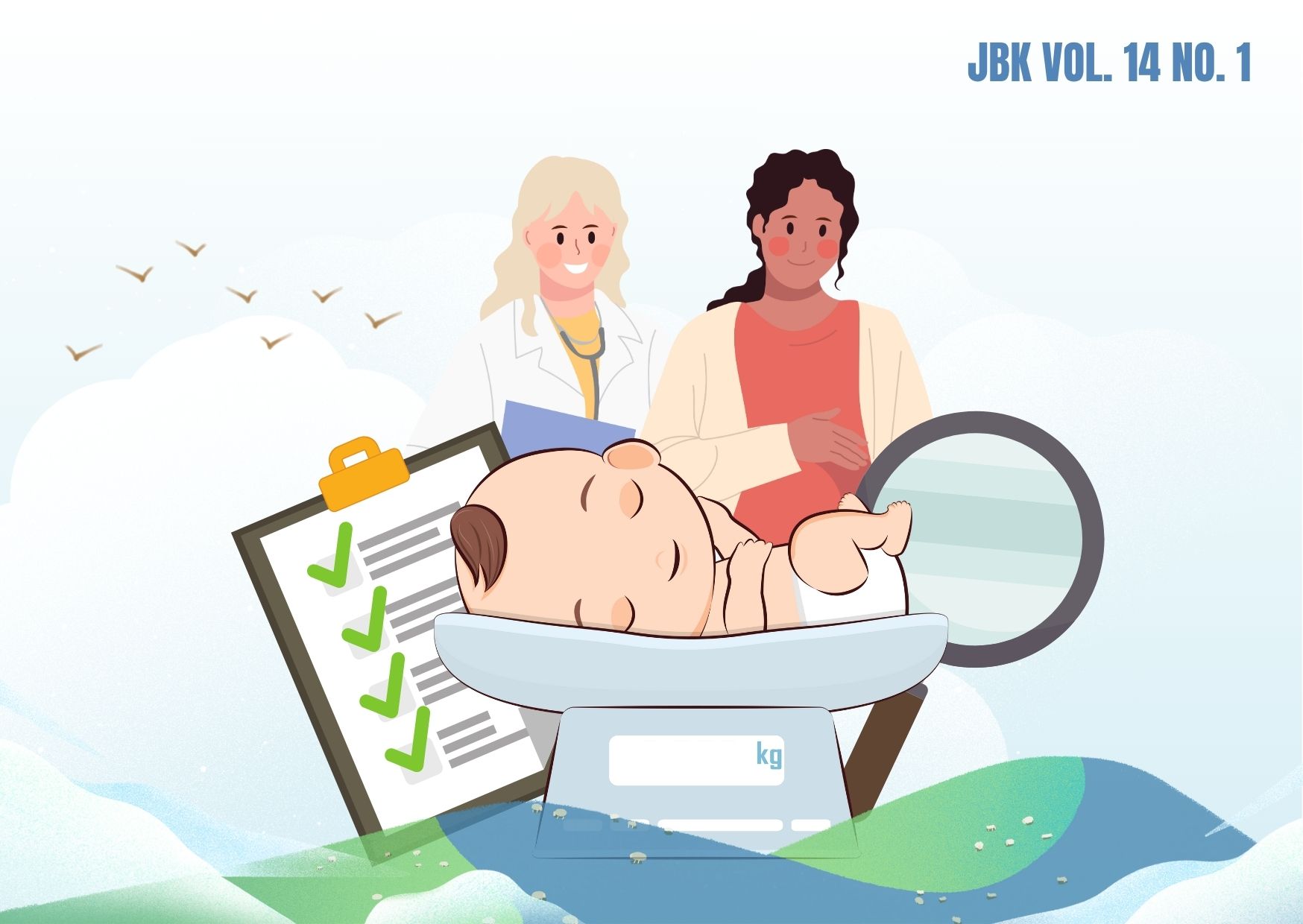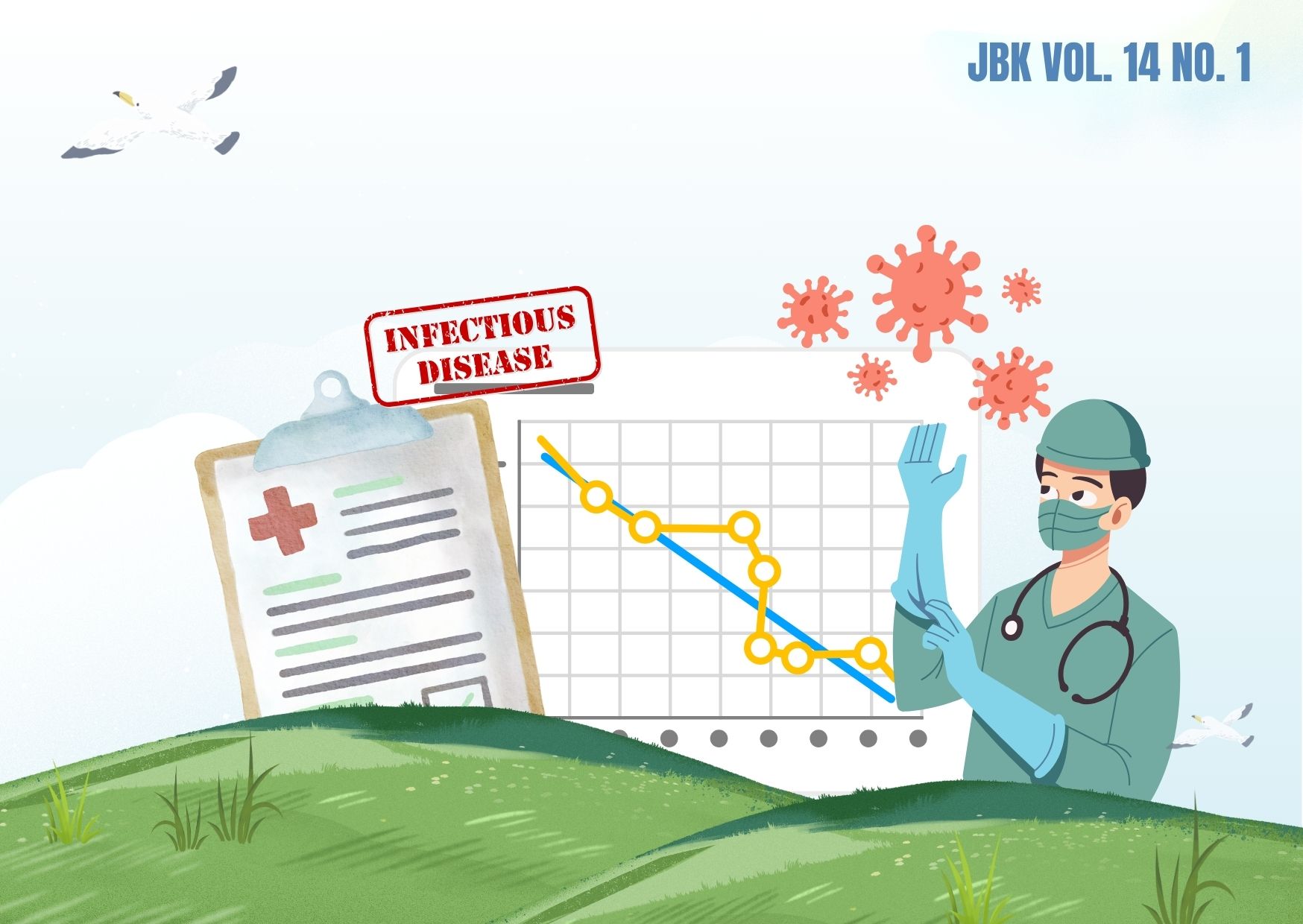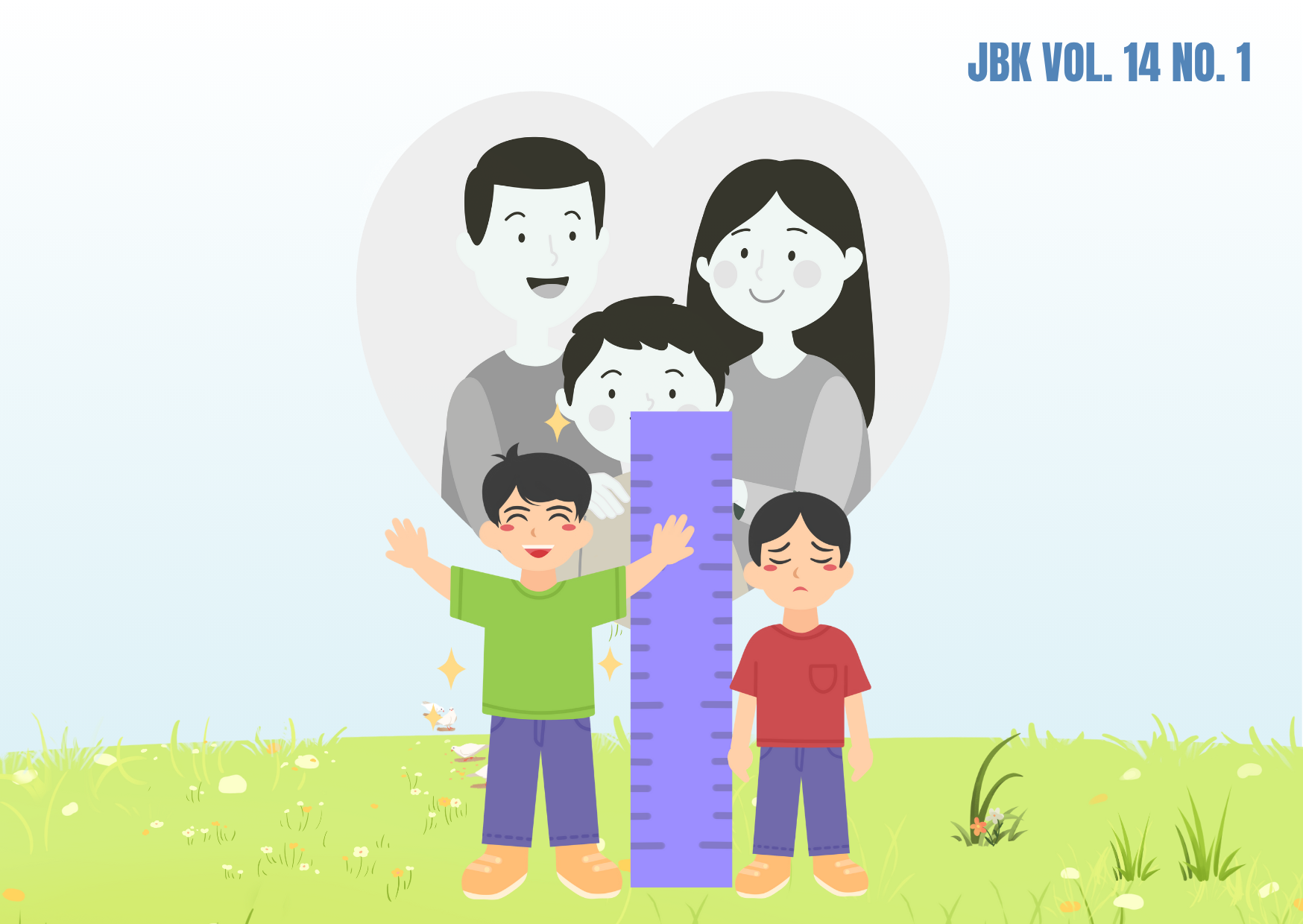DETERMINANTS OF UNINTENDED PREGNANCY AMONG MARRIED WOMEN AGED 15-49 YEARS IN EAST JAVA

Downloads
The percentage of Unintended Pregnancy or Kehamilan Tidak Diinginkan (KTD) in Indonesia is still 17.5%. East Java contributed for 14.6% of cases of KTD during 2019. The increase in fertility rates and maternal mortality cases in Indonesia is partly due to KTD. This study will analyze the determinants of the incident of KTD in women of childbearing age or Wanita Usia Subur (WUS) in East Java. This study is a non-reactional study with a Cross-sectional design using data on the Program Performance and Accountability Survey (PPAS) for Family Planning and Family Development Program (KKBPK) 2019. Sample in this study were 2,650 married WUS with ages 15-49 years. Secondary data were analyzed using multiple logistic regression tests. Some factors that determine the incidence of unintended pregnancy include mother's age (p=0.000), age of first marriage or Usia Kawin Pertama (UKP) (p=0.004), number of living children (p=0.000), welfare level (p=0.004), residence (p=0.043), knowledge of contraception (p=0.022), history of contraceptive use (p=0.001), access of information (p=0.000), and family planning decisions (p=0.003). Meanwhile mother's education (p=0.998), mother's occupation (p=0.362), and insurance ownership (p=0,750) did not affect the case of KTD in East Java. New policies and innovations that are more targeted are needed so that prospective acceptors receive contraceptive services easily and affordably so as to reduce the number of KTD. Optimizing the role of the Family Planning Field Officer or Petugas Lapangan Keluarga Berencana (PLKB) to increase the rate of the use of modern contraceptives in East Java.
Rochaida E. Dampak Pertumbuhan Penduduk terhadap Pertumbuhan Ekonomi dan Keluarga Sejahtera di Provinsi Kalimantan Timur. Forum Ekon [Internet]. 2016;18(1):14–24. Available from: http://journal.feb.unmul.ac.id/index.php/FORUMEKONOMI/article/view/42
National Population and Family Planning Board. SDKI 2017 [Internet]. Survei Demografi dan Kesehatan Indonesia. Jakarta: BKKBN, USAID, Kemenkes RI; 2017. Available from: https://www.un.org/sustainabledevelopment/wp-content/uploads/2015/08/Factsheet_Summit.pdf
Nurlaely Presty D, Sutiawan R, Herdayati M, Anindita Dyah S. Kegagalan Kontrasepsi dengan Kejadian Kehamilan Tidak Diinginkan (KTD) pada Wanita Usia Berisiko Tinggi di Indonesia (Analisis Lanjut Data SDKI 2012) [Internet]. Universitas Indonesia; 2014. Available from: https://lontar.ui.ac.id/detail?id=20386393&lokasi=lokal
Program Performance and Accountability Survey Report. Survei Kinerja dan Akuntabilitas Program (SKAP) Program Kependudukan, Keluarga Berencana, dan Pembangunan Keluarga Modul Wanita. Jakarta; 2019.
Anggraini K, Wratsangka R, Bantas K, Fikawati S. Faktor-Faktor yang Berhubungan dengan Kehamilan Tidak Diinginkan di Indonesia. Promot J Kesehat Masy [Internet]. 2018;8(1):27–37. Available from: https://doi.org/10.31934/promotif.v8i1.227
Palamuleni Martin E. and Adebowale. Prevalence and Determinants of Unintended Pregnancies in Malawi. African Popul Stud [Internet]. 2014;28(1):551–563. Available http://www.bioline.org.br/pdf?ep14010
Central Bureau of Statistics. Berita Resmi Statistik [Internet]. Badan Pusat Statistik. Jakarta; 2018. Available from: www.bps.go.id
Saptarini I, Suparmi. Determinan Kehamilan Tidak Diinginkan di Indonesia (Analisis Data Sekunder Riskesdas 2013). J Kesehat Reproduksi [Internet]. 2016;7(1):15–24. Available from: https://www.neliti.com/id/publications/108065/determinan-kehamilan-tidak-diinginkan-di-indonesia-analisis-data-sekunder-riskes#cite
Ismarwati, Utami I. Faktor-Faktor yang Mempengaruhi Kejadian Kehamilan Tidak Diinginkan pada Remaja. J Heal Stud [Internet]. 2017;1(2):168–177. Available from: https://doi.org/10.31101/jhes.336
Ernawati D, Kurniawati HF, Ismarwati. Gambaran Faktor-Faktor yang Berhubungan dengan Kejadian Kehamilan Tidak Diinginkan pada Remaja (Description of Factors Related to the Event of Undoired Pregnancy in Youth). J Keperawatan dan Kebidanan Aisyiyah. 2018;14(2):124–132.
Dini LI, Riono P, Sulistyowati N. Pengaruh Status Kehamilan Tidak Diinginkan terhadap Perilaku Ibu Selama Kehamilan dan Setelah Kelahiran di Indonesia (Analisis Data SDKI 2012). J Kesehat Reproduksi [Internet]. 2016;7(2):119–133. Available from: https://scholar.ui.ac.id/en/publications/pengaruh-status-kehamilan-tidak-diinginkan-terhadap-perilaku-ibu-
Lontaan A, Kusmiyati, Dompas R. Faktor – Faktor yang Berhubungan dengan Pemilihan Kontrasepsi Pasangan Usia Subur di Puskesmas Damau Kabupaten Talaud. J Ilm Bidan [Internet]. 2014;2(1):27–32. Available from: https://www.neliti.com/id/publications/91154/faktor-faktor-yang-berhubungan-dengan-pemilihan-kontrasepsi-pasangan-usia-subur
Feyisso M, Girma A, Yimam H, Hailu S. Magnitude of Unintended Pregnancy and its Determinants among Pregnant Women Visiting Dilla University Referral Hospital , South Ethiopia. J Women's Heal Care [Internet]. 2017;6(4):1–7. Available from: https://doi.org/10.4172/2167-0420.1000388
Rumaropen NS. Faktor Risiko Kehamilan Tidak Diinginkan pada Pasangan Usia Subur di Surabaya [Internet]. Universitas Airlangga; 2019. Available from: http://repository.unair.ac.id/93485/1/1. COVER.pdf
Junaedi A, Sutiawan R. Hubungan Usia Kawin Pertama terhadap Keluaran Kesehatan Reproduksi Perempuan di Indonesia (Analisis Data Survei Demografi dan Kesehatan Indonesia (SDKI) Tahun 2007) [Internet]. Universitas Indonesia; 2013. Available from: https://adoc.pub/ahmad-junaedi-1-r-sutiawan-2.html
Ali SA, A SA. Unmet Need for Contraception and Unintended Pregnancies Among Women of Reproductive Age Group: A Situation Analysis. El Mednifico J [Internet]. 2014;2(3):259–265. Available from: https://pdfs.semanticscholar.org/6f24/8bbb98b9cd62f1e460a1de3f37a5e6453462.pdf
Ali SA, Ali SA, Khuwaja NS. Determinants of Unintended Pregnancy Among Women of Reproductive Age in Developing Countries : A Narrative Review. J Midwifery Reprod Heal [Internet]. 2016;4(1):513–521. Available from: https://jmrh.mums.ac.ir/article_6206.html
Perwiraningtyas P, Prasetiyo NA. Hubungan Jenis Metode Kontrasepsi dengan Kehamilan Tidak Diinginkan (KTD) pada Pasangan Usia Subur (PUS). Ners LENTERA [Internet]. 2016;4(1):15–25. Available from: http://journal.wima.ac.id/index.php/NERS/article/view/866
Adebowale A, Palamuleni ME. Determinants of Unmet Need for Modern Contraception and Reasons for Non-use Among Married Women in Rural Areas of Burkina Faso. African Popul Stud [Internet]. 2014;28(1):499–514. Available from: http://www.bioline.org.br/pdf?ep14006
Lamina MA. Prevalence and Determinants of Unintended Pregnancy Among Women in South-Western Nigeria. Ghana Med J [Internet]. 2015;49(3):187–194. Available from: https://www.ncbi.nlm.nih.gov/pmc/articles/PMC4676590/
Nyarko SH. Unintended Pregnancy Among Pregnant Women in Ghana : Prevalence and Predictors. J Pregnancy [Internet]. 2019;2019:1–8. Available from: https://doi.org/10.1155/2019/2920491
Ibad M, Lutfiya I, Lutfiya I, Imron A, Imron A, Mardiyono M, et al. Determinan Penggunaan Alat Kontrasepsi Tradisional di Jawa Timur. J Hum Care [Internet]. 2021;6(1):130–138. Available from: https://ojs.fdk.ac.id/index.php/humancare/article/view/1107
Sabatini K. Hubungan Antara Pengetahuan Alat Kontrasepsi Modern dengan Kehamilan Tidak Diinginkan pada Wanita Hamil dan Pasangan Usia Subur di Indonesia (Analisis Data SDKI 2007) [Internet]. Universitas Indonesia; 2012. Available from: http://lib.ui.ac.id/file?file=digital/20308225-T31058-Hubungan antara.pdf
Adhikari R, Soonthorndhada K, Prasartkul P. Determinants of Unintended Pregnancy Among Women in Nepal. Nepal J Obstet Gynaecol [Internet]. 2008;3(2):26–34. Available from: http://dx.doi.org/10.3126/njog.v3i2.10828
Kadarsih M. Discription of Knowledge and Attitude Toward Contraception and Undesired Pregnancy 2017. J Midwifery. 2017;5(1):14–22. Available from: https://jurnal.unived.ac.id/index.php/JM/article/view/567
Adhyani AR. Faktor-Faktor yang Berhubungan dengan Pemilihan Kontrasepsi Non IUD pada Akseptor KB Wanita Usia 20-39 Tahun [Internet]. Universitas Diponegoro; 2011. Available from: http://eprints.undip.ac.id/32865/1/Annisa_Rahma.pdf
Liana I. Efektivitas Program Generasi Berencana Pusat Informasi Konseling (PIK) Remaja Bagi Siswa SMA Negeri di Kota Banda Aceh. J Averrous [Internet]. 2018;4(2):1–12. Available from: https://doi.org/10.29103/averrous.v4i2.1034
Salama SI, Mores CW, Shaaban FA, Azmy OM. Determinants of Unintended Pregnancy and its Impact on the Health of Women in Some Governorates of Upper Egypt. J Arab Soc Med Res [Internet]. 2015;10(1):1–8. Available from: https://www.new.asmr.eg.net/
Goto A, Yasumura S, Reich MR, Fukao A. Factors Associated with Unintended Pregnancy in Yamagata , Japan. Soc Sci Med [Internet]. 2002;54(7):1065–1079. Available from: https://doi.org/10.1016/S0277-9536(01)00081-8
Usman L. Analisis Faktor Determinan yang Berhubungan dengan Kejadian Unmet Need KB Pasangan Usia Subur terhadap Kehamilan yang Tidak Diinginkan di Kecamatan Kota Tengah Kota Gorontalo Tahun 2012 [Internet]. Universitas Hasanuddin; 2013. Available from: http://digilib.unhas.ac.id/
Haffejee F, Connor LO, Govender N, Reddy P, Sibiya MN, Ghuman S, et al. Factors Associated with Unintended Pregnancy Among Women Attending a Public Health Facility in KwaZulu-Natal , South Africa. South African Fam Pract [Internet]. 2018;60(3):79–83. Available from: http://doi.org/10.1080/20786190.2017.1396790
Dixit P, Ram F, Dwivedi LK. Determinants of Unwanted Pregnancies in India Using Matched Case – Control Designs. BMC Pregnancy Childbirth [Internet]. 2012;12(84):1–12. Available from: https://doi.org/10.1186/1471-2393-12-84
Copyright (c) 2022 Jurnal Biometrika dan Kependudukan

This work is licensed under a Creative Commons Attribution-NonCommercial-ShareAlike 4.0 International License.
Copyright©2022 Jurnal Biometrika dan Kependudukan (Journal of Biometrics and Population)
This work is licensed under a Creative Commons Attribution-NonCommercial-ShareAlike 4.0 International License.
1. Copyright of all journal manuscripts is held by the Jurnal Biometrika dan Kependudukan.
2. Formal legal provisions to access digital articles of the electronic journals are subject to the provision of the Creative Commons Attribution-ShareAlike license (CC BY-NC-SA), which means that Jurnal Kesehatan Biometrika dan Kependudukan to keep, transfer media/format, manage in the form of databases, maintain, and publish articles.
3. Published manuscripts both printed and electronic are open access for educational, research, and library purposes. Additionally, the editorial board is not responsible for any violations of copyright law.



































